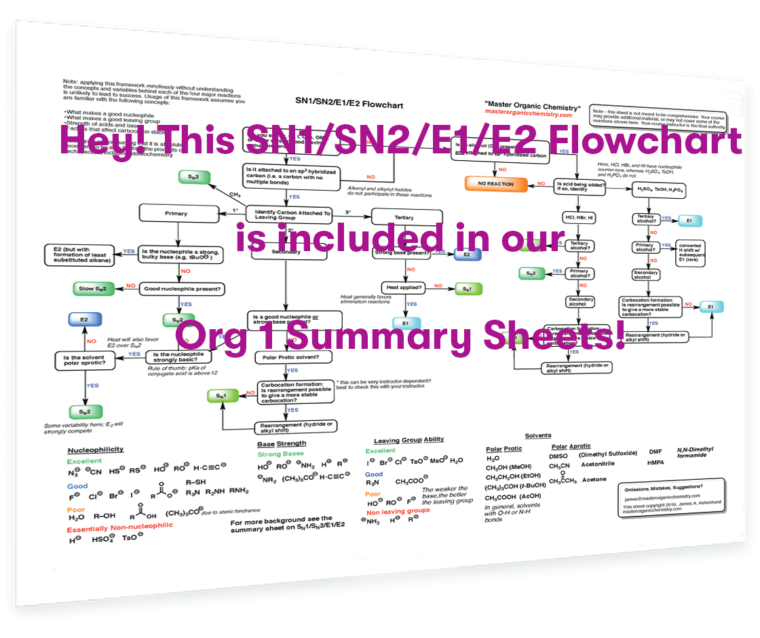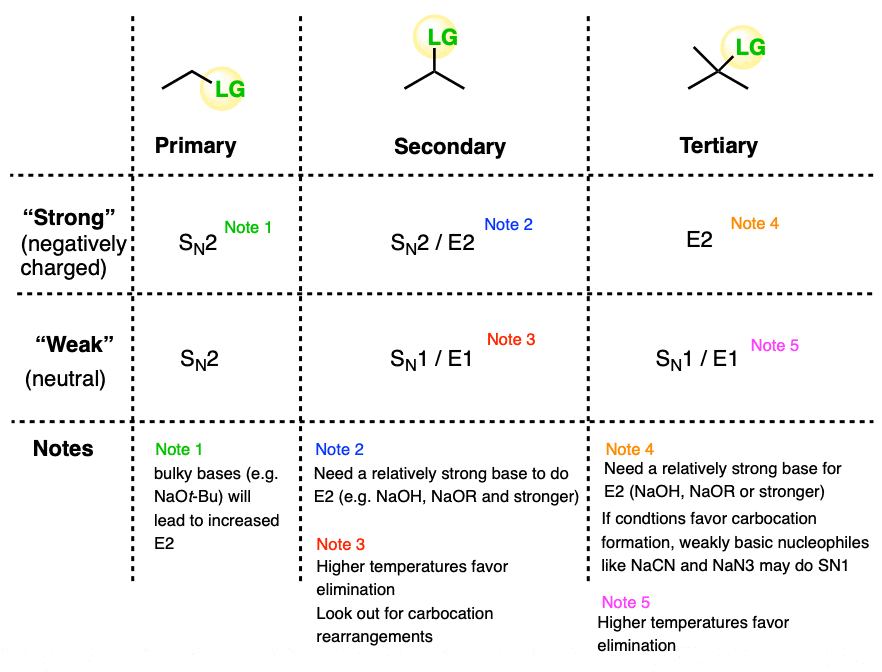Sn1 Sn2 E1 E2 Cheat Sheet - Deciding whether a reaction is s n 1/s n 2/e1/e2 first of all requires understanding the bonds that form and break in each of these. Reactivity of substrates in sn2 and sn1 reactions sn2 reactions go faster as the size ofthesubstrate (and the nucleophile) get smaller. We show you a great chart to decide whether something is e1, e2, sn1, or sn2 then go into a couple of examples.
Deciding whether a reaction is s n 1/s n 2/e1/e2 first of all requires understanding the bonds that form and break in each of these. Reactivity of substrates in sn2 and sn1 reactions sn2 reactions go faster as the size ofthesubstrate (and the nucleophile) get smaller. We show you a great chart to decide whether something is e1, e2, sn1, or sn2 then go into a couple of examples.
We show you a great chart to decide whether something is e1, e2, sn1, or sn2 then go into a couple of examples. Reactivity of substrates in sn2 and sn1 reactions sn2 reactions go faster as the size ofthesubstrate (and the nucleophile) get smaller. Deciding whether a reaction is s n 1/s n 2/e1/e2 first of all requires understanding the bonds that form and break in each of these.
Organic Chemistry Summary Sheet Study Guides Chemistry Steps
Reactivity of substrates in sn2 and sn1 reactions sn2 reactions go faster as the size ofthesubstrate (and the nucleophile) get smaller. We show you a great chart to decide whether something is e1, e2, sn1, or sn2 then go into a couple of examples. Deciding whether a reaction is s n 1/s n 2/e1/e2 first of all requires understanding the.
SN1SN2E1E2 screen chart Organic Chemistry Made Easy by
We show you a great chart to decide whether something is e1, e2, sn1, or sn2 then go into a couple of examples. Reactivity of substrates in sn2 and sn1 reactions sn2 reactions go faster as the size ofthesubstrate (and the nucleophile) get smaller. Deciding whether a reaction is s n 1/s n 2/e1/e2 first of all requires understanding the.
SN1 SN2 E1 E2 cheat sheet Organic Chemistry Nucleophilic Substitution
Reactivity of substrates in sn2 and sn1 reactions sn2 reactions go faster as the size ofthesubstrate (and the nucleophile) get smaller. We show you a great chart to decide whether something is e1, e2, sn1, or sn2 then go into a couple of examples. Deciding whether a reaction is s n 1/s n 2/e1/e2 first of all requires understanding the.
Deciding SN1/SN2/E1/E2 (1) The Substrate Master Organic Chemistry
Reactivity of substrates in sn2 and sn1 reactions sn2 reactions go faster as the size ofthesubstrate (and the nucleophile) get smaller. Deciding whether a reaction is s n 1/s n 2/e1/e2 first of all requires understanding the bonds that form and break in each of these. We show you a great chart to decide whether something is e1, e2, sn1,.
Deciding SN1/SN2/E1/E2 (2) The Nucleophile/Base
Deciding whether a reaction is s n 1/s n 2/e1/e2 first of all requires understanding the bonds that form and break in each of these. Reactivity of substrates in sn2 and sn1 reactions sn2 reactions go faster as the size ofthesubstrate (and the nucleophile) get smaller. We show you a great chart to decide whether something is e1, e2, sn1,.
SN1 SN2 E1 E2 Organic Chemistry Study Guide Cheat Sheet Organic
Reactivity of substrates in sn2 and sn1 reactions sn2 reactions go faster as the size ofthesubstrate (and the nucleophile) get smaller. We show you a great chart to decide whether something is e1, e2, sn1, or sn2 then go into a couple of examples. Deciding whether a reaction is s n 1/s n 2/e1/e2 first of all requires understanding the.
Nucleophile Strength
Reactivity of substrates in sn2 and sn1 reactions sn2 reactions go faster as the size ofthesubstrate (and the nucleophile) get smaller. Deciding whether a reaction is s n 1/s n 2/e1/e2 first of all requires understanding the bonds that form and break in each of these. We show you a great chart to decide whether something is e1, e2, sn1,.
Cheat SheetSummary of all reactions & mechanisms Orgo 2OG3Cheat
Deciding whether a reaction is s n 1/s n 2/e1/e2 first of all requires understanding the bonds that form and break in each of these. We show you a great chart to decide whether something is e1, e2, sn1, or sn2 then go into a couple of examples. Reactivity of substrates in sn2 and sn1 reactions sn2 reactions go faster.
SN1 SN2 E1 E2 cheat sheet Chem 14D Studocu
Reactivity of substrates in sn2 and sn1 reactions sn2 reactions go faster as the size ofthesubstrate (and the nucleophile) get smaller. Deciding whether a reaction is s n 1/s n 2/e1/e2 first of all requires understanding the bonds that form and break in each of these. We show you a great chart to decide whether something is e1, e2, sn1,.
SN1 SN2 E1 E2 Organic Chemistry Study Guide Cheat Sheet
We show you a great chart to decide whether something is e1, e2, sn1, or sn2 then go into a couple of examples. Reactivity of substrates in sn2 and sn1 reactions sn2 reactions go faster as the size ofthesubstrate (and the nucleophile) get smaller. Deciding whether a reaction is s n 1/s n 2/e1/e2 first of all requires understanding the.
Reactivity Of Substrates In Sn2 And Sn1 Reactions Sn2 Reactions Go Faster As The Size Ofthesubstrate (And The Nucleophile) Get Smaller.
We show you a great chart to decide whether something is e1, e2, sn1, or sn2 then go into a couple of examples. Deciding whether a reaction is s n 1/s n 2/e1/e2 first of all requires understanding the bonds that form and break in each of these.









